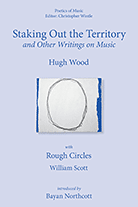‘For a long time now I’ve been sleeping badly, and as often as not awake unwillingly to hear the first bird’s solo breaking through the indigo darkness, before the light and the general dawn chorus. Naturalists will tell us that this choir, although it seems to be one of Nature’s arbitrary beauties, has in fact a strictly functional significance. Each bird is renewing its claim to its own territory for the 24 hours which lie ahead. It struck me that composers, too, sing in order to stake out their territory: in fact we sing – or should – in order to find out what our territory is. Part of the process of creating art (part of its function too) is the slow, painful business of self-discovery. It’s enough for most of us to discover truly where our territory lies.’
Hugh Wood
Ever since his early days, Hugh Wood has pursued a triple career as composer, teacher and writer. He has added significantly to the repertory of orchestral, chamber and vocal music; he has lectured at the Universities of Glasgow, Liverpool and Cambridge; and he has thrown himself into the endless round of articles, reviews and broadcasts that is now part of a musicianís life. What these activities have in common is a keen interest in the highways and byways of European culture, a fastidious style, and a determination to scotch pretence wherever it appears. But behind all this lies another concern, an insatiable quest for knowledge of the territory composers stake out for themselves.
This selection of writings is in three parts and shows three aspects to the quest. The first addresses his own experience; the second maps out the historical and cultural context for a number of orchestral and chamber works in a set of concert essays; and the third draws together several composer-vignettes from his recent reviews for the Times Literary Supplement. The book marks his seventy-fifth birthday and includes eight works by his favourite painter, the British artist William Scott.
was born in 1932. He taught first at the Universities of Glasgow and Liverpool and later at Cambridge, where he was a Fellow of Churchill College. As a leading British composer he has written Scenes from Comus (1965), Concertos for Cello (1969), Violin (1972 and 2004) and Piano (1991), a Chamber Concerto (1971), a Symphony (1982), a Cantata (1989), a set of Orchestral Variations (1997), a Serenade and Elegy (1994), a Divertimento for strings (2007), five String Quartets (1962-2001), a Piano Trio (1984), a Horn Trio (1989) and several collections of songs.
(Editor) teaches at King’s College London and is author of All the Gods. Benjamin Britten’s Night-piece in Context (2006). He has edited four volumes of writings by Hans Keller, including Essays on Music (CUP, 1994) and Film Music and Beyond (Plumbago, 2006).



